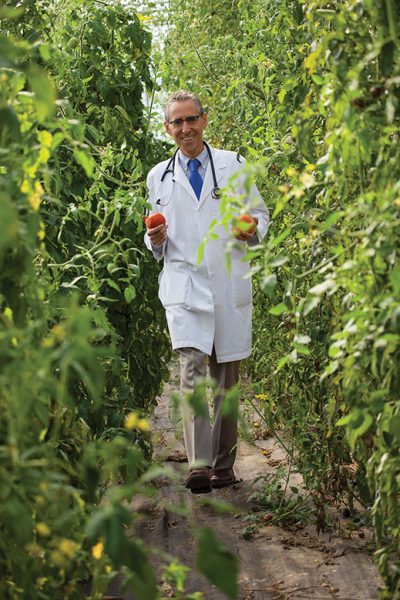
Ron Weiss is not your typical MD. His practice is located on 342 acres of farmland stretching below Schooley’s Mountain in Long Valley. Here, he grows produce free of synthetic chemicals for patients who follow his food-is-medicine mantra.
“If I get to say one thing to people to get them to understand why we’re here on a farm, it’s that food is medicine, and food is the most powerful medicine,” Weiss says as he peers out a window, scanning his property from the post-World War II farmhand house that is home to his practice, Ethos Primary Care. “Food is so powerful in its abilities to heal, but also in its abilities to cause disease, and it just turns out that’s the basis of most people’s problems.”
Ethos Primary Care focuses on helping patients prevent or reverse chronic illnesses like hypertension, diabetes and asthma by using a combination of “living medicines”—nutrient-dense fruits and vegetables grown without synthetic chemicals—mixed with a mindful approach toward health.
Weiss, who holds bachelor’s degrees in botany and music from Rutgers University and a medical degree from Rutgers New Jersey Medical School, says the importance of food was revealed to him in 1991, when his father was diagnosed with pancreatic cancer. Doctors gave his father less than three months to live. A newly minted doctor himself, Weiss would not accept that nothing could be done. He turned to the local library, where he devoured books on nutrition and its ability to heal—something he says he was never taught in medical school—and put his father on a whole-foods, plant-based (WFPB) diet. The senior Weiss ended up living for 18 fruitful months.
“My father’s transformation was nothing short of astounding,” he gushes. This prompted Weiss to look at food as the foundation of health when treating patients. Although he continued to practice conventionally for 26 years, he finally sold his practice in West New York and purchased the 275-year-old farm in 2011; he opened Ethos Primary Care, an integrative medicine practice, in 2014.
The Ethos staff includes a patient-care manager, a healthy-living associate, a wellness-program coordinator and a farm manager who is well versed in growing produce without synthetics. Only 15 acres of Ethos Farm—a national historic landmark—are used for crops, although that is slowly expanding. The farm practices regenerative agriculture, restoring the land and creating quality soil with methods like cover crops, composting and meadow restoration. This makes the soil optimally healthy not only for humans, but for the endangered and threatened species that live on the farm’s vast acreage, as well as for those living downstream along the Raritan River, the headwaters of which run through the property.
Patients, ranging from those still in the womb to those in their 90s, come from all over the country to see Weiss. For many, a visit to Ethos Primary Care is a last-ditch effort to address their chronic illness. “Usually when we see [patients], it’s because they have failed conventional means,” he says.
Since launching Ethos Primary Care, Weiss claims to have successfully treated a whole host of patients with his WFPB approach. Patients, he says, see their acne clear up, their weight slide off, their reliance on medication evaporate and their “incurable” diseases cured.
Weiss cites the case of a woman who sought him out in March 2016 with a list of illnesses and medications too long to fit on one sheet of paper.
The 49-year-old patient came to Weiss weighing 284 pounds, with a BMI of 69, blood sugar in the 300s, a blood pressure of 150 over 100 and a heart rate of 90 beats per minute. She was on 24 medications to address issues including high blood pressure, diabetes, severe ulcerative colitis, inflammatory arthritis, asthma, migraines, obstructive sleep apnea and TMJ.
On day one of adopting Weiss’s WFPB diet, the patient was able to go off her blood pressure medications altogether. Within 30 days, she lost 30 pounds, her blood pressure dropped to 128 over 70 and her heart rate had dropped to 60 beats per minute. By day 75, she was able to go off insulin. Today, she is on only three medications and continues to drop weight.
“It’s probably one of the most amazing cases I have ever witnessed as a doctor,” Weiss says. “Why? The person is mindful of everything and is so dedicated.”
While Weiss relies on food as the foundation of helping his patients reach optimal health, he also credits mindfulness—on his part and his patients’—for much of his success. In order to be a good physician, he says, he must be continually mindful of what the root causes of his patients’ problems are—whether physical, emotional, psychological or all three—and he must ensure that patients are properly educated and mindful of those root causes and understand the steps he deems necessary for treatment.
“I know Parkinson’s is hard, Alzheimer’s is a difficult problem, osteoporosis is a difficult problem, psoriasis can be a really hard problem, so can lupus and kidney failure,” Weiss says. “But what I have found in my practice of medicine is if you’re mindful and you accept what the causes are, and you’re mindful about how you dedicate yourself at a very high level, you can overcome your problems.”
Weiss offers a yearlong program, Ascent to Wellness: A Year of Mindful Living, that combines classes, counseling and peer support to guide patients with chronic illnesses as they transition to a WFPB diet. The program symbolically culminates each year with a 14-mile, round-trip hike to the top of Mount Marcy, the tallest peak in New York.
“It’s a metaphor for the journey of health,” says Weiss. “Trying to turn your health around takes a lot of mindful attention, and it’s hard. It’s like climbing up a mountain. So we take them up a mountain. At first, a lot of people may not be able to get up the mountain. But as their health improves, they can.”



